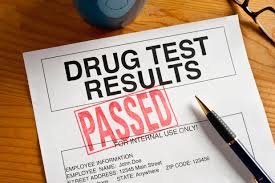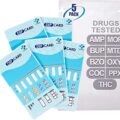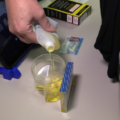A drug test looks for the presence of one or more illegal or prescription drugs in your urine, blood, saliva, hair, or sweat. Urine testing is the most common type of drug screening. Other names of this analysis include; drug screen, drug test, drugs of abuse testing, substance abuse testing, toxicology screen, tox screen, sports doping tests.
One of the major challenges of urine drug testing is adulteration, a practice involving manipulation of a urine specimen with chemical adulterants to produce a false negative test result. This problem is compounded by the number of easily obtained chemicals that can effectively adulterate a urine specimen.
What happens during a drug test?
A drug test generally requires that you give a urine sample in a lab. You will be given instructions to provide a “clean catch” sample. The clean catch method includes the following steps:
- Wash your hands
- Clean your genital area with a cleansing pad given to you by your provider. Men should wipe the tip of their penis. Women should open their labia and clean from front to back.
- Start to urinate into the toilet.
- Move the collection container under your urine stream.
- Collect at least an ounce or two of urine into the container, which should have markings to indicate the amounts.
- Finish urinating into the toilet.
- Return the sample container to the lab technician or health care provider.
In certain instances, a medical technician or other staff member may need to be present while you provide your sample.
Can they legally watch you pee for a drug test?
Usually not. Some courts have found it to be an unfair invasion of privacy to watch employees urinate. However, most courts have held that it is reasonable to enforce other safeguards that protect against tampering with urine specimens.
What is it used for?
Drug screening is used to find out whether or not a person has taken a certain drug or drugs. It may be used for:
Employment. Employers may test you before hiring and/or after hiring to check for on-the-job drug use.
Sports organizations. Professional and collegiate athletes usually need to take a test for performance-enhancing drugs or other substances.
Legal or forensic purposes. Testing may be part of a criminal or motor vehicle accident investigation. Drug screening may also be ordered as part of a court case.
Monitoring opioid use. If you’ve been prescribed an opioid for chronic pain, your health care provider may order a drug test to make sure you are taking the right amount of your medicine.
Why do I need a drug test?
You may have to take a drug test as a condition of your employment, in order to participate in organized sports, or as part of a police investigation or court case. Your health care provider may order drug screening if you have symptoms of drug abuse. These symptoms include:
- Slowed or slurred speech
- Dilated or small pupils
- Agitation
- Panic
- Paranoia
- Delirium
- Difficulty breathing
- Nausea
- Changes in blood pressure or heart rhythm
For a blood test for drugs, you will go to a lab to provide your sample. During the test, a health care professional will take a blood sample from a vein in your arm, using a small needle. After the needle is inserted, a small amount of blood will be collected into a test tube or vial. You may feel a little sting when the needle goes in or out. This usually takes less than five minutes.
Will I need to do anything to prepare for the test?
Be sure to tell the testing provider or your health care provider if you are taking any prescription drugs, over-the-counter medicines, or supplements because they may give you a positive result for certain illegal drugs. Also, you should avoid foods with poppy seeds, which can cause a positive result for opioids.
What do the results mean?
If your results are negative, it means no drugs were found in your body, or the level of drugs was below an established level, which differs depending on the drug. If your results are positive, it means one or more drugs were found in your body above an established level. However, false positives can happen. So if your first test shows that you have drugs in your system, you will have further testing to figure out whether or not you are actually taking a certain drug or drugs.
Can you put Visine in your urine to pass a drug test?
Attempts to dilute, adulterate, and substitute urine may be detected by visual inspection and laboratory validity testing. Validity testing of urine specimens includes temperature, specific gravity, pH, urine creatinine, and presence of adulterants. Urine temperature within 4 minutes of voiding should range from 90°F to 100°F in a healthy individual, whereas temperatures outside of this range may suggest a substituted specimen has been provided. Many specimen cups have a temperature gauge on the side of the cup. A specimen outside of the physiological range should be recollected.
Urine samples are sometimes contaminated deliberately by ingestion or addition of a foreign substance to prevent detection of illicit drugs. Common methods of tampering include dilution with water, addition of extraneous substances, or substitution of samples. Studies reveal that at low concentrations of Visine, false-negative cannabinoid results were attributable to the benzalkonium chloride ingredient of Visine. The added Visine was not detectable by routine urine analysis and had no effect on the activity of the glucose-6-phosphate dehydrogenase-drug conjugate used in the assays.
It is important to note that putting Visine eye drops in your urine cannot help you pass a drug test because even when contaminated with Visine, analysis by gas chromatography/mass spectrometry will reveal any drug present in the Visine-adulterated urine specimens.
Are there any risks to the test?
There are no known physical risks to having a drug test, but a positive result may affect other aspects of your life, including your job, your eligibility to play sports, and the outcome of a court case. Before you take a drug test, you should be told what you are being tested for, why you are being tested, and how the results will be used. If you have questions or concerns about your test, talk to your health care provider or contact the individual or organization that ordered the test. SEE: What Does Mop Mean On A Drug Test?






